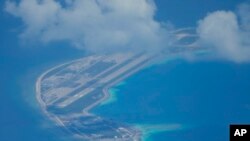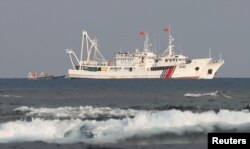On January 30, China’s coast guard expelled Japanese ships from the contested Senkaku (Diaoyu) islands in the East China Sea.
China’s coast guard stepped up patrols around Japan last December, following the Japanese government’s release of three security documents calling China “the greatest strategic challenge” in the region.
It’s not just Japan that’s feeling the heat.
On January 30, the Asia Maritime Transparency Initiative (AMTI), a project of the Center for Strategic and International Studies, a Washington, D.C., think tank, released a report calling China’s coast guard presence in the South China Sea “more robust than ever.”
That presence, AMTI says, is aimed at helping Beijing assert its sweeping claims to most of the South China Sea.
Asked about the AMTI report, China’s Foreign Ministry spokesperson Mao Ning said the country’s coast guard is operating above board.
“In accordance with China’s domestic law and international law including UNCLOS (the United Nations Convention on the Law of the Sea), China Coast Guard ships conduct patrol and management in waters under China’s jurisdiction to maintain maritime order and protect China’s legitimate and lawful rights and interests,” Mao said.
That is false.
Beijing has consistently ignored a key international court ruling and the U.N. Law of the Sea, which outlines the territorial waters of China’s neighbors. The Chinese coast guard routinely engages in malign activities in the Western Pacific Ocean and beyond to assert China's claims to territory and natural resources.
For its report, AMTI analyzed data from a system that automatically tracks the movements of ships and found that China’s coast guard had conducted “near-daily patrols at key features across the South China Sea in 2022.”
Those patrols covered several disputed maritime features, including Scarborough Shoal, 220 kilometers east of the Philippines island of Luzon, where China’s coast guard maintains a blockade.
That blockade has denied small-scale Philippines fisherman their fishing rights in the area, in violation of an international court ruling.
China’s coast guard has blocked and used water cannons against Philippine resupply ships headed to another feature — the Second Thomas (Ayungin) Shoal, which falls within the Philippines’ exclusive economic zone .
Exclusive economic zones are recognized in the U.N. Law of the Sea as the 200-nautical mile stretch of sea from the coast of a state.
In 2013, the Philippines initiated a claim against China at the Permanent Court of Arbitration the Hague, stating that China’s sweeping claims denied the Philippines its own “historic rights” in the South China Sea.
In 2016, the international court largely found in the Philippines favor, reaffirming the right of states to operate within their exclusive economic zones.
China has ignored that ruling.
On May 31, 2022, the Philippines protested what it called the Chinese coast guard’s “harassment” of a Taiwanese ship with Filipino scientists carrying out research in the South China Sea.
The Philippines has lodged more than 300 diplomatic protests against Beijing's actions in the South China Sea.
In 1995, China seized Mischief Reef, another South China Sea feature, from the Philippines. The Hague ruled that the reef is part of the Philippines’ continental shelf and in its exclusive economic zones.
On February 2, the Philippines reached an agreement with the United States allowing for a more robust U.S. military presence in the country.
China has made similar moves against other neighbors.
The number of days China’s coast guard patrolled near Vanguard Bank, “a major site of Vietnamese oil and gas development,” more than doubled from 142 in 2020 to 310 in 2022.
That is part of China’s efforts to keep Vietnam from engaging in hydrocarbon drilling in its own exclusive economic zones, as allowed under U.N. Law of the Sea.
China has threatened to use force to stop Vietnamese drilling projects in the region, and sunk Vietnamese fishing boats near the Paracel Islands, another disputed South China Sea Island chain (in 1974, China seized the Vietnamese-controlled part of the Paracel Islands.)
The frequency of daily Chinese coast guard patrols at the Luconia Shoals, some 99 kilometers off the coast of Malaysia’s Borneo island, increased from 279 days in 2020 to 316 in 2022.
The Loconia Shoals is a site of Malaysian oil and gas operations.
After Vietnam and Indonesia hammered out an agreement on the boundaries of their exclusive economic zones in the southern portion of the South China Sea, China dispatched its largest coast guard vessels to patrol Indonesia’s Natuna Islands to “send a signal,” regional experts told the South China Morning Post.
On January 14, Indonesia dispatched a warship to monitor a Chinese coast guard vessel that had been sailing near the site of an Indonesian gas field and a Vietnamese oil and gas field.
The unfriendly actions of China’s maritime forces extend beyond the region.
As Polygraph.info and others have reported, China has sent warships to escort illegal fishing expeditions. China’s fishing fleets have notoriously rammed competitors and foreign patrol ships, and systematically engaged in illegal fishing as far afield as South America.
In January 2021, Beijing passed a bill granting its coast guard the right to fire on ships in disputed waters.
China has also built more than two dozen outposts in the South China Sea and militarized at least three islands.






